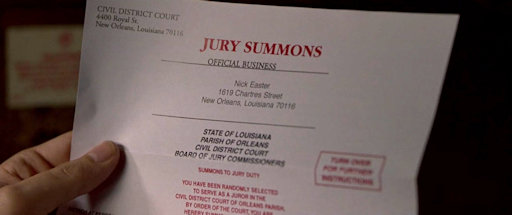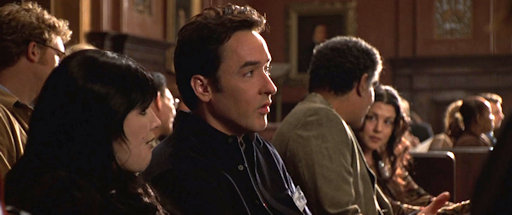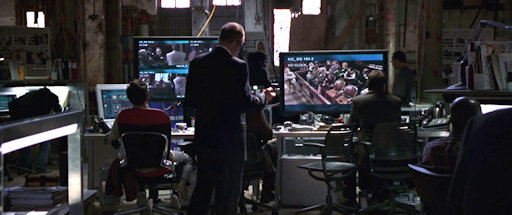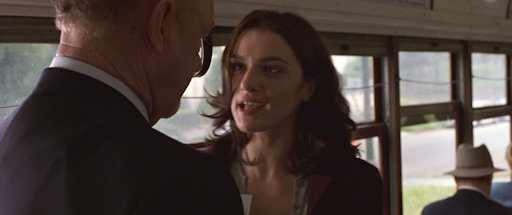Number 159 of a Series
Another first time for me. This came out in 2003 when I was up to my neck in some work projects and didn’t have time to watch on TV, much less go to theaters. It’s Runaway Jury, based on a novel by John Grisham. I didn’t read the book, either, so all the background is from Wikipedia.
- John Cusack as Nicholas “Nick” Easter
- Gene Hackman as Rankin Fitch
- Dustin Hoffman as Wendell Rohr
- Rachel Weisz as Marlee
- Bruce Davison as Durwood Cable
- Bruce McGill as Judge Frederick Harkin
- Jeremy Piven as Lawrence Greene
- Nick Searcy as Doyle
- Stanley Anderson as Henry Jankle
- Marguerite Moreau as Amanda Monroe
- Leland Orser as Lamb
- Gerry Bamman as Herman Grimes
- Nestor Serrano as Janovich
- Joanna Going as Celeste Wood
- Cliff Curtis as Frank Herrera
- Jennifer Beals as Vanessa Lembeck
- Bill Nunn as Lonnie Shaver
- Juanita Jennings as Loreen Duke
- Nora Dunn as Stella Hulic
- Guy Torry as Eddie Weese
- Rusty Schwimmer as Millie Dupree
- Rhoda Griffis as Rikki Coleman
- Corri English as Lydia Deets
- Lori Heuring as Maxine
- Dylan McDermott (uncredited) as Jacob Wood
The Wikipedia entry has an excellent synopsis of the plot, so I will post some screen shots and some comment.
It starts off as a beautiful Monday morning in New Orleans. We see flashbacks from the day before when they celebrated the fifth birthday of Jacob Woods’ son. He drives into work and carries two cups of coffee up the elevator to the office where he works. Along the way he snags a woman co-worker and beckons her into his private office. Some shenanigans, perhaps? No, he wants her to help him recall the words to a song from the birthday party. He needs to sing it that night to his son at bed time.
He starts to hum the tune. She chimes in. It goes back and forth until they are singing the lyrics together.
One evening as the sun went down
And the jungle fire was burning
Down the track came a hobo hiking
And he said, “Boys, I’m not turning”“I’m headed for a land that’s far away
Besides the crystal fountains
So come with me, we’ll go and see
The Big Rock Candy Mountains”
And that is as far as they get. It’s the last thing they do in their lives.
Their singing is interrupted by loud bangs out in the office. One, then two in rapid succession, then more. Then more. He opens the door and attempts to intervene, but others are fleeing and falling, shot. He retreats to the office and orders the woman to call 911. She gets on and tells of shots fired. There is a hectic interchange, and she gets put on hold. Then the shooter is inside the office, firing at the woman. He shoots Jacob, and the picture goes blank.

An employee who was fired has returned with a semi-automatic pistol with 20-round magazines. He has killed eleven people and wounded others before killing himself. Two years later there is a trial. The widow Woods is suing Vicksburg Firearms, the company that marketed the configuration used in the shooting. Nicholas “Nick” Easter receives a jury summons. Vicksburg Firearms has requested a jury trial, else there would be no movie.

We see Dustin Hoffman as the plaintiff’s lawyer Rankin Fitch. He dismisses a prospective jury consultant as unneeded. This movie is going to be all about selecting and influencing the jury.

Rankin Fitch is attorney for Vicksburg Firearms, and he is without par in the depravity of his dealings. He has his own team of jury consultants. They have surreptitiously followed prospective jurors, making videos and prying into their private lives.

Sitting in the jury panel Nick begins to work the job he set out to do. He has no outside team of investigators, but he observes panelists up close and gradually gets the lay of the land.

Just a screen shot showing Judge Frederick Harkin as he gets the voir dire process going.

Big bucks are behind the defense of the gun industry. Legality and morality, not so much. A video camera hidden inside a briefcase projects a view of the courtroom to the defense team operations room. Most definitely illegal—a thing that would get all involved arrested and disbarred for life.

Marlee is a friend of Nick’s. Actually, they share a bed. Wearing a disguise she drops identical envelopes on the plaintiff’s and defense’s tables. “Jury For Sale,” says the caption showing the final panel. On the flip side it tells that jurors are purchased for $24 a day and lunch. This gets the lawyers interested. She contacts both sides. $10 million. The first to take the offer gets the jury.

Skipping a lot of interesting detail, we get to the trial. Plaintiff’s attorney Rohr displays the murder weapon to a gun salesman on the witness stand. How many? Dozens in that configuration. For what use? Home defense maybe? The jury is getting the impression Vicksburg has been marketing these weapons in a volume that would win wars and showing no concern as to how they will be used.

But Rohr’s key witness disappears. He is a former Vicksburg employee who has agreed to testify, but has now taken some money and skedaddled.
Fitch, observing video of the trial, spots Nick as the fly in the ointment. A Fitch agent searches Nick’s apartment. Nick obtains security video of the crime.

There is a follow-up attempt, and Nick’s secret files are located. They are encrypted, but the encryption can be broken. The crook torches Nick’s place, and Nick shows his video to the judge. This gets the jury sequestered.
The defense gang attempts to kidnap Marlee, but she eludes the attempt and goes to Fitch. The price is now $15 million.
Rohr decides he will not pay the demand, and goes forward to win the trial on its merits.

Fitch’s witness, a Vicksburg executive, cracks on the stand, seriously damaging his case. He pays the $15 million.
But Nick has succeeded in influencing the jury, and it is all quite simple. Do the right thing. Fitch has learned from one of his investigators that Marlee had a sister who was killed in a shooting, and Fitch successfully defended the gun company.
After Fitch loses the case—$110 million to the plaintiff—Marlee shows him a receipt for the $15 million. He will never work again, else she will deliver the receipt to the judge.

From Wikipedia I learn the book is about a suit against tobacco companies, but the theme is the same. It’s corporations putting profit ahead of public safety. In the real world suits such of this seldom prevail, and when they do prevail appeals usually reverse the original decision or else whittle down the award. In this case a win of any kind would be a blow to gun manufacturers that sell dangerous weapons knowing how they will be used and without regard to the consequences.
The opener is a masterpiece of movie drama. There is the buildup to a comical episode abruptly terminated by massive violence. It caught me off guard completely. Jacob Wood is shown as an absolutely worthwhile human being and you hated to see him die so uselessly.
A thing I never came to understand was how Nick got on the jury. Could be I need to watch again, but the first indication we get is when he opens his mailbox and pulls out the jury summons. If Nick does not get on the jury, there is no movie.
The capers pulled by the defense team are so outlandish as to be unbelievable. Who thinks anybody would attempt to pull this kind of shit?
Update
Since reviewing the movie I obtained a Kindle edition of the book, whose title is The Runaway Jury, not Runaway Jury. First, take my word for it. The movie tells the story better.
The characters are the same, name for name. The locale is Biloxi instead of New Orleans. And nobody dies on-screen. Author John Grisham stretches the story out far too long, and if you have already seen the movie you will keep turning pages, wondering when Grisham is going to get to some kind of closure.
A big part of the book is Nick Easter’s maneuvering to get the jury sequestered. Once that is achieved the plot crowds up with numerous instances of inter-juror hijinks, with people sneaking out and playing beach blanked bingo among the rooms. The book devolves into tales of jurors demanding and receiving sumptuous meals, trips to church, deep sea fishing, and on. Grisham is a lawyer, so I have to wonder why he says in the book all this expense is being picked up by the tax payers. No. This is a civil trial, and the litigants pay all expenses.
And there is no attempt to kidnap Marlee, and she does not up the price to $15 million to deliver a verdict. And in the end Marlee uses the ten million to short tobacco stocks and make a nice profit before returning the ten to Fitch. In all Grisham novels I have read the victors get handsomely rewarded and go off into the sunset, not always figuratively.

One thought on “Wednesday Bad Movie”